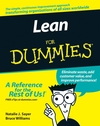 Tip of the hat to Jon Miller for finding this first. I have to chime in.
Tip of the hat to Jon Miller for finding this first. I have to chime in.
I'm sure a lot of us have joked about it, a book called “Lean for Dummies.” Unfortunately, now it is here: Lean For Dummies.
To be clear, I'm not endorsing the book. I haven't read it. (Updated 4:22 PM: I have a copy of the book on order, I'll read it and do a review here). You can download the first chapter here from the publisher, Wiley.
I'm reminded of a few things. One is a Toyota quote (Updated 4:22 PM exact quote, courtesy of blog reader Jeff):
“We obtain brilliant results from average people operating brilliant processes. But we observe that most companies obtain mediocre or worse results from brilliant people working around broken processes.”
Toyota is very selective when they hire, they certainly aren't hiring “dummies.”
I am also reminded of the phrase “Poka Yoke,” or as I've heard it translated “error proofing” or “mistake proofing.” The phrases “fool proofing” or “dummy proofing” are pretty common in the business culture, but I don't like them. They aren't respectful phrases. Error proofing helps us prevent good people from making systemic mistakes. We're all human after all.
There's a related quote from the healthcare world, a leader at the World Health Organization, a quote that reminded me of Toyota:
“Human error is inevitable. We can never eliminate it. We can eliminate problems in the system that make it more likely to happen.”
People aren't dummies. Back to “Poka Yoke,” my dad asked a Japanese colleague (not a former Toyota employee) who had used the phrase “fool proofing” about the Japanese words. He wrote:
“Pokah Yoke”: Pokah means “stupid mistake” and Yoke means “avoid”.
I was surprised to hear that. I thought the phrase “Poka Yoke” avoided nuance like “stupid,” “fool,” or “dummy.” The story I had heard was that a different Japanese phrase “Baka Yoke” was originally used, but it meant “dummy” and it made a Toyota employee cry, so Shingo changed it to “Poka Yoke.” Quarterman Lee has a recounting of the story on his website, via an interview with our friend Norman Bodek.
I understand the “For Dummies” series is meant to be light-hearted, but I've seen too many cases in different manufacturing companies where a manager or an engineer referred to production workers as “dummies.” That always stung and that's why I cringe at “for Dummies” in this context.
Update 3/18: Jon Miller posted a full review of the book here, with some constructive criticism.
Please scroll down (or click) to post a comment. Connect with me on LinkedIn.
Let’s work together to build a culture of continuous improvement and psychological safety. If you're a leader looking to create lasting change—not just projects—I help organizations:
- Engage people at all levels in sustainable improvement
- Shift from fear of mistakes to learning from them
- Apply Lean thinking in practical, people-centered ways
Interested in coaching or a keynote talk? Let’s start a conversation.









![When Was the Last Time a Leader Around You Admitted They Were Wrong? [Poll]](https://www.leanblog.org/wp-content/uploads/2025/07/Lean-Blog-Post-Cover-Image-2025-07-01T212509.843-100x75.jpg)
I think you were off-base on your review of Lean for Dummies. It’s an extremely popular brand name that’s done well and many people like the books as great references without feeling like they are a dummy for buying it. Just because it’s about lean shouldn’t change that fact. I think you’re reading way too much into it.
I received the book and will read it soon. I noticed in the back of the book, they list some online lean resources, including this blog and many others on my “Blogroll” list of blogs. I won’t let that influence my review.
I’ve lately read “Toyota Production System” by Taiichi Ohno and to my surprise, he’s not talking of “poka yoke” but of “baka yoke”. Now Baka means “idiot”.
Makes you look to “respect for people” from another perspective. Same goes for dummies :)
Interesting, I thought Ohno eventually moved away from using “baka yoke.”
[…] dummies series stupid name – I normally hate the term “dummies,” but the Lean For Dummies was surprisingly […]
[…] at the recent ASQ Lean and Six Sigma Conference, where she was also a presenter. While I was a bit resistant at first to the “for Dummies” being associated with Lean (given that “dummy” is a sort of disrespectful word), I came around when I read the […]